
South East Asia Research
Scope & Guideline
Pioneering Scholarly Dialogue on Regional Issues
Introduction
Aims and Scopes
- Interdisciplinary Research:
The journal publishes articles that draw from various fields such as history, sociology, anthropology, political science, and cultural studies, providing a comprehensive understanding of Southeast Asian issues. - Focus on Historical Contexts:
Many studies emphasize historical narratives and their impacts on contemporary society, politics, and culture in Southeast Asia, offering insights into colonial and post-colonial dynamics. - Cultural Analysis:
The journal highlights cultural practices, literature, and narratives, exploring the role of culture in shaping identities and social structures within Southeast Asia. - Political and Economic Dynamics:
Research often delves into political movements, governance, and economic transformations, examining how these factors influence social inequalities and regional stability. - Regional and Global Interactions:
Articles frequently address Southeast Asia's relations with global powers, regional organizations like ASEAN, and the implications of globalization on local communities.
Trending and Emerging
- Identity Politics and Social Movements:
There is an increasing focus on identity politics, including ethnic, gender, and sexual identities, as well as grassroots social movements, highlighting the role of marginalized voices in shaping political discourse. - Environmental and Urban Studies:
Research on environmental issues and urbanization trends is gaining traction, addressing the impacts of climate change, urban migration, and sustainability practices in Southeast Asian contexts. - Digital Media and Communication:
The exploration of social media, digital activism, and their effects on societal change is emerging as a prominent theme, reflecting the region's rapid technological advancements and their implications for politics and culture. - Transnational Perspectives:
There is a growing interest in transnational studies that examine cross-border interactions, migration, and cultural exchanges, recognizing the interconnectedness of Southeast Asian nations. - Health and Well-being:
Emerging themes also include research on health disparities, mental health issues, and the impacts of pandemics on communities, emphasizing the need for comprehensive health policies in Southeast Asia.
Declining or Waning
- Traditional Colonial Studies:
Research centered on colonial histories and their direct impacts is becoming less frequent, with a shift towards contemporary issues and localized narratives instead. - Narrow Nationalistic Focus:
There is a noticeable decline in studies that focus solely on nationalistic perspectives, as scholars increasingly adopt transnational and regional frameworks that better capture the complexities of Southeast Asia. - Static Cultural Representations:
Themes that rely on static or monolithic representations of cultures are waning, as there is a growing demand for nuanced, dynamic portrayals that reflect the diversity and evolution of identities in the region. - Conventional Economic Analyses:
Traditional economic analyses that do not incorporate socio-cultural dimensions or contemporary challenges, such as climate change and migration, are being phased out in favor of more integrated approaches. - Outdated Political Paradigms:
Research that adheres to outdated political paradigms, such as simplistic East-West dichotomies, is declining as scholars seek more complex understandings of political dynamics.
Similar Journals
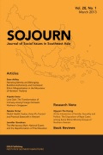
SOJOURN-Journal of Social Issues in Southeast Asia
Unveiling Insights into Southeast Asia's Societal DynamicsSOJOURN - Journal of Social Issues in Southeast Asia is a distinguished academic publication that has been at the forefront of exploring and analyzing the complex social issues within the Southeast Asian region since its inception. Published by the Institute of Southeast Asian Studies (ISEAS)Anthropology, Sociology, and Political Science. With its ISSN 0217-9520 and E-ISSN 1793-2858, SOJOURN holds a Q3 ranking in both anthropology and sociology categories, reflecting its significant contribution to the literature and its commitment to enhancing understanding of the societal dynamics in Southeast Asia. Although currently not an open-access journal, it provides a vital platform for researchers, professionals, and students dedicated to looking beyond surface issues and diving deep into the cultural and political landscapes of the region. As the journal continues to publish until 2024, it remains an essential resource for knowledge and scholarship, fostering academic dialogue and innovative research in a rapidly evolving socio-political environment.
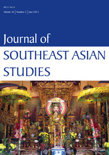
JOURNAL OF SOUTHEAST ASIAN STUDIES
Navigating the Dynamic Socio-Cultural Terrain of Southeast Asia.JOURNAL OF SOUTHEAST ASIAN STUDIES, published by Cambridge University Press, stands as a vital platform for scholarly research and discourse in the realms of Geography, Planning and Development, History, and Sociology and Political Science. With its origins tracing back to 1970, this esteemed journal has continuously evolved to reflect the dynamic socio-cultural and political landscapes of Southeast Asia, making it an indispensable resource for researchers, professionals, and students alike. The journal boasts an impressive impact factor, and while it remains non-open access, it provides robust support to academics through its insightful contributions to the field. With rankings that place it in the Q4 category for Geography, Q2 for History, and Q3 for Sociology and Political Science in 2023, the JOURNAL OF SOUTHEAST ASIAN STUDIES is poised to be a preeminent resource for innovative research and critical analysis of the region's diverse complexities.
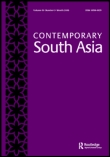
Contemporary South Asia
Navigating the Socio-Political Landscape of South AsiaContemporary South Asia, a peer-reviewed journal published by Routledge Journals, Taylor & Francis Ltd, stands as a critical platform for scholarly discourse in the fields of Development, Geography, and Political Science, with a notable impact factor that reflects its significance in academic circles. With a focus on the socio-political and economic dynamics of South Asia, the journal provides a rigorous forum for researchers, professionals, and students to engage with diverse perspectives and empirical studies from the region. Covering articles from 1992 to 2024, it has earned a commendable reputation as evidenced by its Q2 ranking across multiple categories in 2023 in both Development and Geography, as well as Political Science and International Relations. This journal not only hosts a plethora of insightful research but also serves as an essential resource for those seeking to understand the complexities of contemporary issues affecting South Asia. While it operates under a subscription model, the quality and relevance of the content ensure it remains a vital tool for intellectual inquiry and policy analysis in an increasingly interconnected world.
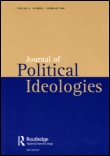
JOURNAL OF POLITICAL IDEOLOGIES
Advancing Discourse in Political IdeologiesJOURNAL OF POLITICAL IDEOLOGIES is a distinguished scholarly periodical published by Routledge Journals, Taylor & Francis Ltd, exploring the multifaceted terrain of political thought and its implications in the modern political landscape. With its ISSN 1356-9317 and E-ISSN 1469-9613, this journal serves as a vital resource for researchers, professionals, and students in the fields of Political Science and Geography. Since its inception in 1996 and continuing through 2024, the journal has established itself as a reputable forum for critical discourse, ranking in the top quartile (Q2) for both Political Science and International Relations as well as Geography, Planning, and Development categories in 2023. With a strong Scopus rank of #132/706 in Political Science, reflecting an impressive 81st percentile, it stands out as an influential source for advancing knowledge in its field. Although it is not an Open Access journal, the impactful research published therein contributes significantly to academic discussions and policy debates, making it an essential read for anyone engaged in the study of political ideologies.

POST-SOVIET AFFAIRS
Fostering Interdisciplinary Insights into Post-Soviet AffairsPOST-SOVIET AFFAIRS, published by ROUTLEDGE JOURNALS, TAYLOR & FRANCIS LTD, is a distinguished academic journal dedicated to exploring the socio-economic and political transformations of post-Soviet states since its inception in 1992. With a significant focus on interdisciplinary collaboration, the journal garners an impressive impact factor, underscoring its vital role in the study of contemporary issues in economics, political science, and sociology, as evidenced by its Q1 ranking in these fields in 2023. Operating from the United Kingdom, the journal champions critical analysis and encourages contributions that enhance understanding of the complex dynamics within post-Soviet societies. Researchers, professionals, and students are welcomed to engage with its rich repository of articles, each offering insights into transitional economies, international relations, and social changes. While the journal is not open access, it remains a pivotal resource for anyone wanting to stay informed on impactful research trends and findings in this vital area of study.

Journal of Belgian History-Revue Belge d Histoire Contemporaine-Belgisch Tijdschrift voor Nieuwste Geschiedenis
Illuminating Belgium's Historical LandscapeThe Journal of Belgian History-Revue Belge d'Histoire Contemporaine-Belgisch Tijdschrift voor Nieuwste Geschiedenis is a prominent academic publication dedicated to the exploration and analysis of contemporary Belgian history. Published by SOMA-CEGES, this journal serves as a vital resource for researchers, professionals, and students alike, providing a platform for scholarly discourse and the dissemination of innovative research in the field. Despite its historical significance, the journal faced a hiatus in its Scopus coverage from 2019, yet it retains a strong identity within the Arts and Humanities category, holding a Scopus rank of #1123 out of 1328, placing it in the 15th percentile. This underscores the opportunities for growth and impactful contributions within the journal's scope. By focusing on the intricacies of Belgian history, the journal encourages rigorous investigation and a deeper understanding of Belgium's past, making it an essential reference for anyone interested in European historical narratives.

Midland History
Charting the Course of Midlands' Historical LegacyMidland History is a distinguished academic journal, grounded in the rich historical tapestry of the United Kingdom, and published by Routledge Journals, Taylor & Francis Ltd. With an ISSN of 0047-729X and an E-ISSN of 1756-381X, this journal serves as a vital platform for scholarly discourse on various aspects of regional and national history. Although categorized in the Q4 quartile for History in 2023, Midland History is committed to bridging gaps in current historical research and provides a unique opportunity for researchers, professionals, and students to engage with new findings and interpretations. The journal has been published in converged issues spanning from 1971 to 2024, indicating a long-standing commitment to scholarly excellence. Contributions often focus on the social, cultural, and political narratives that shaped the Midlands, making it an important resource for those interested in the intersections of historical practice and contemporary thought. While not currently an open-access journal, Midland History’s contributions are pivotal for fostering a deeper understanding of history within academic circles.
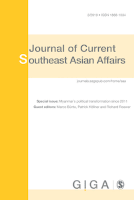
Journal of Current Southeast Asian Affairs
Connecting minds through current affairs and research.Welcome to the Journal of Current Southeast Asian Affairs, a premier open-access publication dedicated to advancing scholarly research and discussions in the fields of Political Science, International Relations, and Sociology. Published by SAGE Publications Inc in Germany since 2009, this journal has secured its place as a leading academic resource, evidenced by its impressive Q1 rankings in both Political Science and Sociology categories for 2023. With a Scopus rank placing it in the 91st percentile for Political Science and 86th for Sociology, the journal serves as a critical platform for researchers, professionals, and students to engage with timely issues and developments in Southeast Asia. Its commitment to open access ensures that vital findings are accessible to a global audience, promoting informed discourse and interdisciplinary collaboration. Publish your research in a journal that is shaping the future of Southeast Asian scholarship.
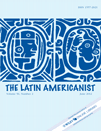
Latin Americanist
Navigating the Diverse Landscapes of Latin American ThoughtLatin Americanist is a distinguished academic journal published by the University of North Carolina Press, dedicated to advancing scholarly discourse on issues pertinent to Latin America and its diasporas. With an ISSN of 1557-2021 and an E-ISSN of 1557-203X, this publication seeks to illuminate the complexities of cultural, social, and political dynamics within the region through rigorous research and critical analysis. Although it currently operates under a subscription model, the journal remains an essential resource for researchers, students, and professionals eager to engage with contemporary Latin American studies. The journal's commitment to quality scholarship fosters a vibrant community aimed at deepening understanding of Latin American identities and transformations. Its contributions make it a vital platform for innovative ideas and discussions that shape the understanding of this diverse and influential region.

Contemporary Southeast Asia
Illuminating Insights into Southeast Asia's FutureContemporary Southeast Asia is a leading academic journal published by the Institute of Southeast Asian Studies (ISEAS), Singapore, offering insightful analyses and discussions on the dynamic socio-political landscape of Southeast Asia. With an ISSN of 0129-797X and an E-ISSN of 1793-284X, this journal has been a significant contributor to the fields of Development, History, Political Science, and Sociology since its inception in 1979, and it continues to shape discourse through its robust publication record extending into 2024. The journal holds prestigious rankings, including Q2 in Development and Political Science, Q1 in History, and Q2 in Sociology, reflecting its rigorous scholarship and impact in the academic community. Researchers, professionals, and students will find valuable resources within its articles that address critical issues pertinent to the region, fostering a deeper understanding of Southeast Asia’s role in global contexts. Although the journal currently does not provide Open Access options, its contributions remain invaluable to those engaged in the study of this vibrant and diverse area.